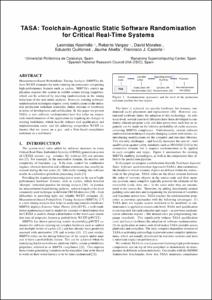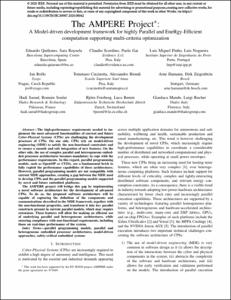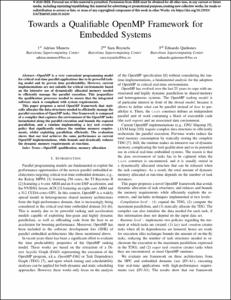Exploració per autor "Quiñones, Eduardo"
Ara es mostren els items 50-61 de 61
-
TASA: toolchain-agnostic static software randomisation for critical real-time systems

Kosmidis, Leonidas; Vargas, Roberto; Morales, David; Quiñones, Eduardo; Abella Ferrer, Jaume; Cazorla Almeida, Francisco Javier (Association for Computing Machinery (ACM), 2016)
Kosmidis, Leonidas; Vargas, Roberto; Morales, David; Quiñones, Eduardo; Abella Ferrer, Jaume; Cazorla Almeida, Francisco Javier (Association for Computing Machinery (ACM), 2016)
Text en actes de congrés
Accés obertMeasurement-Based Probabilistic Timing Analysis (MBPTA) derives WCET estimates for tasks running on processors comprising high-performance features such as caches. MBPTA's correct application requires the system to exhibit ... -
Techniques for reducing and bounding OpenMP dynamic memory

Munera, Adrian; Royuela, Sara; Quiñones, Eduardo (Barcelona Supercomputing Center, 2019-05-07)
Munera, Adrian; Royuela, Sara; Quiñones, Eduardo (Barcelona Supercomputing Center, 2019-05-07)
Text en actes de congrés
Accés obertOpenMP offers a tasking model very convenient to develop critical real-time parallel applications by virtue of its time predictability. However, current implementations make an intensive use of dynamic memory to efficiently ... -
The AMPERE Project: A Model-driven development framework for highly Parallel and EneRgy-Efficient computation supporting multi-criteria optimization

Quiñones, Eduardo; Royuela Alcázar, Sara; Scordino, Claudio; Gai, Paolo; Pinho, Luis Miguel; Nogueira, Luis; Rollo, Jan; Cuccinottta, Tommaso; Biondi, Alessandro; Hammam, Arne; Ziegenbein, Dirk; Saoud, Hadi; Forsberg, Björn; Benini, Luca; Mando, Gianluca; Rucher, Luigi (Institute of Electrical and Electronics Engineers (IEEE), 2020)
Quiñones, Eduardo; Royuela Alcázar, Sara; Scordino, Claudio; Gai, Paolo; Pinho, Luis Miguel; Nogueira, Luis; Rollo, Jan; Cuccinottta, Tommaso; Biondi, Alessandro; Hammam, Arne; Ziegenbein, Dirk; Saoud, Hadi; Forsberg, Björn; Benini, Luca; Mando, Gianluca; Rucher, Luigi (Institute of Electrical and Electronics Engineers (IEEE), 2020)
Text en actes de congrés
Accés obertThe high-performance requirements needed to implement the most advanced functionalities of current and future Cyber-Physical Systems (CPSs) are challenging the development processes of CPSs. On one side, CPSs rely on ... -
The DeepHealth Toolkit: A key European free and open-source software for deep learning and computer vision ready to exploit heterogeneous HPC and cloud architectures

Aldinucci, Marco; Atienza, David; Bolelli, Federico; Caballero, Mónica; Colonnelli, Iacopo; Quiñones, Eduardo (Springer, Cham, 2022-04)
Aldinucci, Marco; Atienza, David; Bolelli, Federico; Caballero, Mónica; Colonnelli, Iacopo; Quiñones, Eduardo (Springer, Cham, 2022-04)
Capítol de llibre
Accés obertAt the present time, we are immersed in the convergence between Big Data, High-Performance Computing and Artificial Intelligence. Technological progress in these three areas has accelerated in recent years, forcing different ... -
The next convergence: High-performance and mission-critical markets

Girbal, Sylvain; Moretó Planas, Miquel; Grasset, Arnaud; Abella Ferrer, Jaume; Quiñones, Eduardo; Cazorla Almeida, Francisco Javier; Yehia, Sami (2013)
Girbal, Sylvain; Moretó Planas, Miquel; Grasset, Arnaud; Abella Ferrer, Jaume; Quiñones, Eduardo; Cazorla Almeida, Francisco Javier; Yehia, Sami (2013)
Text en actes de congrés
Accés obertThe well-known convergence of the high-performance computing and the mobile markets has been a dominating factor in the computing market during the last two decades. In this paper we witness a new type of convergence between ... -
The OpenMP API for high integrity systems: Moving responsibility from users to vendors

Klemm, Michael; Quiñones, Eduardo; Taft, Tucker; Ziegenbein, Dirk; Royuela Alcázar, Sara (Association for Computing Machinery, 2021)
Klemm, Michael; Quiñones, Eduardo; Taft, Tucker; Ziegenbein, Dirk; Royuela Alcázar, Sara (Association for Computing Machinery, 2021)
Article
Accés obertOpenMP is traditionally focused on boosting performance in HPC systems. However, other domains are showing an increasing interest in the use of OpenMP by virtue of key aspects introduced in recent versions of the specification: ... -
Time-analysable non-partitioned shared caches for real-time multicore systems

Slijepcevic, Mladen; Kosmidis, Leonidas; Abella Ferrer, Jaume; Quiñones, Eduardo; Cazorla Almeida, Francisco Javier (Association for Computing Machinery (ACM), 2014)
Slijepcevic, Mladen; Kosmidis, Leonidas; Abella Ferrer, Jaume; Quiñones, Eduardo; Cazorla Almeida, Francisco Javier (Association for Computing Machinery (ACM), 2014)
Text en actes de congrés
Accés restringit per política de l'editorialShared caches in multicores challenge Worst-Case Execution Time (WCET) estimation due to inter-task interferences. Hard-ware and software cache partitioning address this issue although they complicate data sharing among ... -
Time-predictable parallel programming models

Serrano, María A.; Quiñones, Eduardo (Barcelona Supercomputing Center, 2017-05-04)
Serrano, María A.; Quiñones, Eduardo (Barcelona Supercomputing Center, 2017-05-04)
Text en actes de congrés
Accés obertEmbedded Computing (EC) systems are increas-ingly concerned with providing higher performance in real-time while HPC applications require huge amounts of information to be processed within a bounded amount of time. Addressing ... -
Time-predictable task-to-thread mapping in multi-core processors

Samadi, Mohammad; Royuela Alcázar, Sara; Pinho, Luis Miguel; Carvalho, Tiago; Quiñones, Eduardo (Elsevier, 2024)
Samadi, Mohammad; Royuela Alcázar, Sara; Pinho, Luis Miguel; Carvalho, Tiago; Quiñones, Eduardo (Elsevier, 2024)
Article
Accés obertThe performance of time-predictable systems can be improved in multi-core processors using parallel programming models (e.g., OpenMP). However, schedulability analysis of parallel applications is a big challenge due to ... -
Timing verification of fault-tolerant chips for safety-critical applications in harsh environments

Slijepcevic, Mladen; Kosmidis, Leonidas; Abella Ferrer, Jaume; Quiñones, Eduardo; Cazorla, Francisco J. (2014-11-01)
Slijepcevic, Mladen; Kosmidis, Leonidas; Abella Ferrer, Jaume; Quiñones, Eduardo; Cazorla, Francisco J. (2014-11-01)
Article
Accés restringit per política de l'editorialCritical real-time embedded systems feature complex safety-related, performance-demanding functionality. High-performance hardware and software can provide such functionality, but the use of aggressive technologies and ... -
Towards a qualifiable openMP framework for embedded systems

Munera, Adrian; Royuela Alcázar, Sara; Quiñones, Eduardo (Institute of Electrical and Electronics Engineers (IEEE), 2020)
Munera, Adrian; Royuela Alcázar, Sara; Quiñones, Eduardo (Institute of Electrical and Electronics Engineers (IEEE), 2020)
Text en actes de congrés
Accés obertOpenMP is a very convenient programming model for critical real-time parallel applications due to its powerful tasking model and its proven time predictability. However, current implementations are not suitable for critical ... -
Using randomized caches in probabilistic real-time systems

Quiñones, Eduardo; Berger, Emery D.; Bernat, Guillem; Cazorla Almeida, Francisco Javier (2009)
Quiñones, Eduardo; Berger, Emery D.; Bernat, Guillem; Cazorla Almeida, Francisco Javier (2009)
Text en actes de congrés
Accés restringit per política de l'editorialWhile hardware caches are generally effective at improving application performance, they greatly complicate performance prediction. Slight changes in memory layout or data access patterns can lead to large and ...










